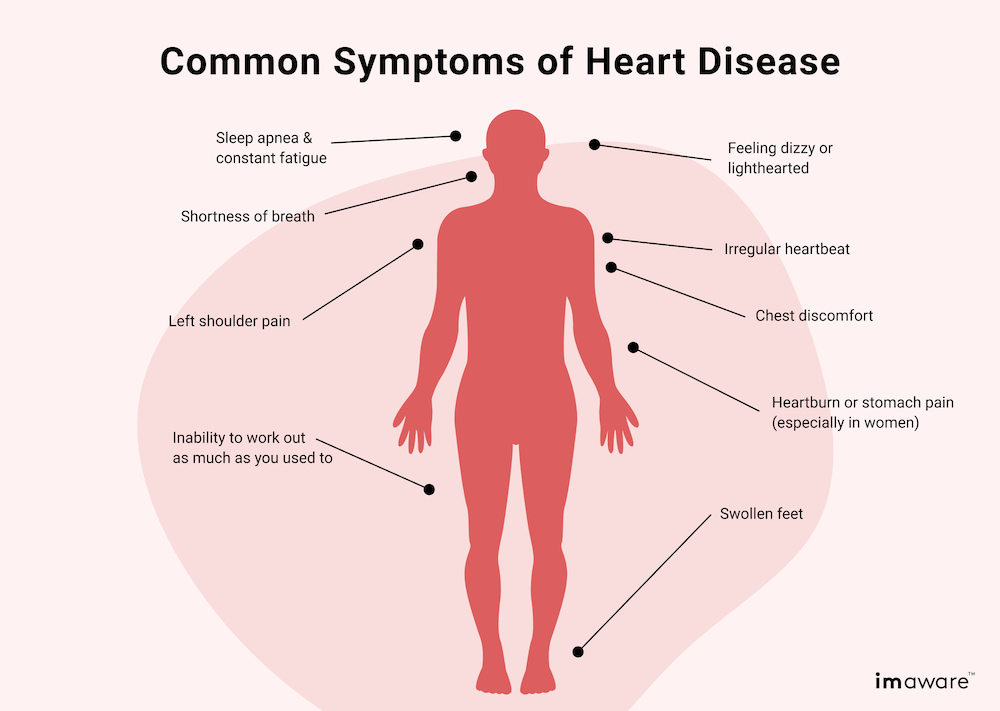While there are a variety of possible symptoms of heart disease, there are several common ones that should never be ignored. Often, the symptoms of this medical condition can also be a symptom of another illness. By talking with your health care provider about these issues, you can help to identify problems earlier. The following are some of the most common heart disease warning signs. These can be an indication that you should seek medical attention. In addition, the early detection of heart disease will allow you to take steps to improve your overall health.
Chest pain: Although this is a broad term, it refers to any discomfort in the chest, neck, upper abdomen, jaw, or head. Sometimes, the discomfort is felt in the arm or head as well. Another symptom of heart disease is palpitations. This symptom is caused by the irregularity of the heartbeat. Some people may notice skips or rapidity of their heartbeat, which are common signs of heart disease.
Angina: Chest pain is an imprecise term, but it can indicate discomfort in the chest area, upper abdominal region, or jaw. A common symptom of heart disease is chest discomfort, which may also occur in the arms or legs. Unlike other symptoms, chest pain can be intermittent. Similarly, chest discomfort may accompany other aches and pains in the neck or arms. Other signs of heart disease include palpitations, which is an unusually rapid or slow heartbeat.
Chest pain: This pain is often vague and difficult to describe, particularly if you’re experiencing discomfort in your chest. However, chest pain can be associated with other symptoms, including discomfort in the head, neck, and upper abdomen. A person experiencing palpitations will usually report a rapid or skip-like heartbeat. Some people may experience an uncomfortable throbbing sensation in their arm. In addition to a heart attack, a person with a recurring bout of chest pain may have a persistent feeling of tiredness.
Some people may not experience any symptoms of heart disease. Some individuals may have no signs at all. For example, they might not feel any pain. Patients who have symptoms of heart disease may report feeling weak, tired, or a general maladjusted. But, if you feel any of these signs or other signs, you should consult a medical professional. The doctor will be able to prescribe medications that can help improve the condition.

Some people experience atypical symptoms of heart disease. These people do not always show the typical symptoms of the disease. Some people do not experience chest pain. Others do not experience this symptom. Most people with heart disease do not experience any pain. They may feel tired and dizzy. These symptoms may be a sign of heart problems. They may also be a sign of another condition. If they experience chest pain, they should seek medical attention as soon as possible.
People with heart disease may experience symptoms that are not physically present. Some people may experience pain in the chest, neck, upper abdomen, jaw, or arms. Some people may also experience palpitations. This is a noticeable difference in heart rate. Often, the heartbeat can be fast or irregular. This is a sign of heart problems. While it can happen on its own, it’s important to see a doctor for a diagnosis.
The most common symptom of cardiovascular disease is chest pain. This may be the most noticeable symptom, but other symptoms may also occur. Some of these symptoms may be the result of other heart conditions, including high blood pressure, peptic ulcers, or lung problems. If you notice these symptoms, contact your doctor and health website as soon as possible https://www.healthbrandsshop.com/. These signs can be a warning sign of heart problems. This can be a common symptom of a heart attack.
Chest pain is another common symptom of cardiovascular disease. Although the condition is usually asymptomatic in its early stages, in some cases symptoms do not appear until after a heart attack. In some cases, chest pain is a sign of heart failure. You may also experience fatigue, but this is unlikely to be caused by a heart attack. You may only experience mild or asymptomatic heart pain, but this is a sign of heart disease.
